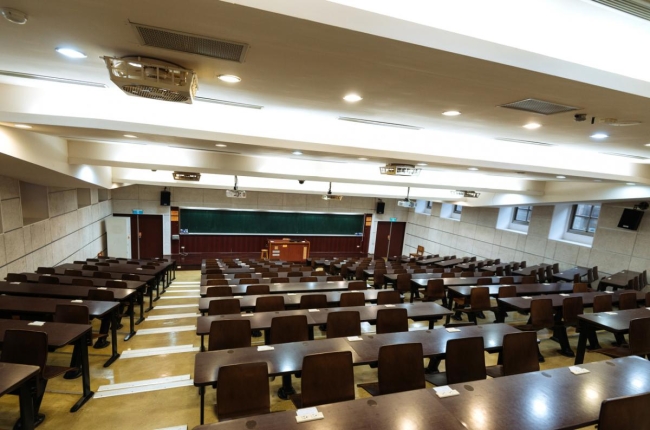You have /5 articles left.
Sign up for a free account or log in.

Istock.com/Drazen_
Wednesday afternoon, 14 college presidents from around the country gathered in front of their computers. On their screens they saw their peers, along with Vice President Mike Pence and U.S. Education Secretary Betsy DeVos, who asked what they needed to reopen their campuses in the fall.
The presidents spoke about the need to be able to do more testing for the coronavirus, according to those who were either on the call or were knowledgeable about the conversation. But the presidents also said they needed to know their college wouldn’t get sued if anyone got sick, which is almost inevitable.
“They were mostly in listening mode, wanting to hear what the federal government could do to be helpful,” said University of Texas at El Paso president Heather Wilson, who was on the call. One way it can help, said Wilson, a former Republican congresswoman from New Mexico and secretary of the Air Force, “is to have some kind of liability protection.”
Colleges, in seeking that protection from Pence and from a Senate committee this week, aren’t alone. Manufacturers and business groups like the U.S. Chamber of Commerce have been pushing to be freed, at least temporarily during the pandemic, from being held liable if workers, customers and others get sick on their property -- something a lawyer for Texas Christian University told senators is “foreseeable, perhaps inevitable.”
Coming as President Trump encouraged governors in Colorado and North Dakota on Wednesday to reopen schools as an important step toward returning to normalcy, businesses' fears of being sued are being picked up by the Senate’s Republican majority.
On the Senate floor and while speaking to reporters Tuesday, Senate Majority Leader Mitch McConnell said Republicans are working on a proposal to give businesses confidence they won’t be held liable.
“Many of us are very anxious to get back to some level of economic interaction and do it safely,” he said. “Can you imagine the nightmare that can unfold this fall if K-12 kids are still at home and colleges and universities are still not open? And that scenario is further aggravated in the absence of some kind of liability protection that reassures school administrators that they can open up again as long as they do it safely and follow the guidelines.”
The push comes as college and university presidents struggle over questions beyond legal liability, and as the Republican chairman of the Senate education committee expressed optimism that enough coronavirus tests would be available in the fall for colleges to reopen.
“I think any principal, any chancellor of a university can say, ‘We will take testing. We'll take pneumonia shots. We'll try to keep people as separate as possible. We'll keep administrative staff at home. We'll develop a strategy for going back to school and to college that is safe,’” Lamar Alexander, the Tennessee Republican, said on NPR. “That may take staggered weeks of schooling, and they'll take more flexible days. A number of changes. But I think the question is not do we go, I think it's how we go.”
Peter McDonough, general counsel for the American Council on Education, which represents colleges and universities, said in an interview that colleges should be able to decide whether to physically reopen based only on whether students and workers would be safe, not on other factors like having to defend lawsuits.
“We don’t want colleges to postpone reopening because they are in fear of the unknown or inevitably costly lawsuits,” he said.
He and others like Wilson argue, as well, that reopened colleges would play a vital role in re-energizing the economy because of the number of workers they employ and the importance they play in many towns. Wilson also said that colleges are hoping for protection from lawsuits seeking refunds on tuition or room and board.
An education committee aide said in an email that Alexander also supports shielding colleges from liability.
McConnell has insisted that any future coronavirus relief package would have to include liability protections.
It’s unclear what Republicans will propose, but the day before the college presidents spoke with Pence, Senator Lindsey Graham, the Republican chairman of the judiciary committee, said at a committee hearing that members of Congress do not want to override states. But he alluded to tying coronavirus aid to the states' shielding businesses from liability, at least temporarily. States can’t complain, Graham said. After accepting “a bunch of money” from Congress, they “can’t say we have no business in this other arena.”
However, the idea worries unions, who say that shielding businesses from being sued will lead to workers being put in riskier situations.
“It could send a dangerous message [to businesses] that the safety of these workers is not their responsibility,” Marc Perrone, president of the United Food and Commercial Workers International Union, said at the judiciary committee hearing.
The debate comes as the Labor Department’s Occupational Safety and Health Administration has come under fire from critics for not issuing more worker safety regulations guiding businesses on what they’re supposed to do to protect workers and customers.
Part of the problems facing both employers and workers, labor and business leaders agreed at the hearing, is that there are no clear standards for what businesses are supposed to do.
Under liability law, businesses are freed from being responsible if they are deemed to be taking reasonable steps to protect people. But as the nation continues to struggle to find a way to stem the spread of coronavirus, there is no definition of what steps would protect colleges from being held legally liable.
“There is no playbook. There are no established best practices, and this uncertainty is impacting our decisions,” Larry Leroy Tyner Jr., Texas Christian University’s general counsel, told senators at the hearing.
Tyner, testifying on behalf of the American Council on Education, likened the current uncertainty of approaching a cliff and not knowing where there is “some line that would be catastrophic to step across.” Given the uncertainty, many colleges are reluctant to move forward and reopen.
“If we don't know exactly where the edge of the cliff is, we will avoid the ground near the cliff altogether,” he said.
One example of the uncertainty over what standards colleges will be judged by, he said, are plans by the University of Arizona and the University of California, San Diego to reopen by doing extensive testing of students and workers for the virus.
But smaller schools “that can’t possibly measure up” to testing for the virus as extensively worry the courts will find them liable for students getting the virus if they reopen without doing the same as the other institutions, he said.
In addition, Tyner said, colleges and universities operate “utilities, buses, police. They’re landlords and they operate food service, retail shops, convenience stores, health clinics, gyms,” as well as sports stadiums and entertainment venues. “Unlike other businesses,” he said, “we have to operate many lines of business.”
Making the decision to reopen even more complex, McDonough said, is that most campuses are open to the public. “We don’t want to put up chain-link fences with checkpoints where there are temperatures being taken and testing,” he said.
However, Georgetown University law professor David Vladeck argued at the hearing that once campuses and businesses are given exact minimum standards by the government of what’s expected of them, that should be enough to protect them from being held liable.
And giving colleges and businesses immunity from being legally liable would be counterproductive, he said.
“Consumers and workers are going to feel like they’re going back to work or to grocery stores at their peril,” he said, “if they feel like Congress has given employers and businesses a free pass to shortchange safety.”








